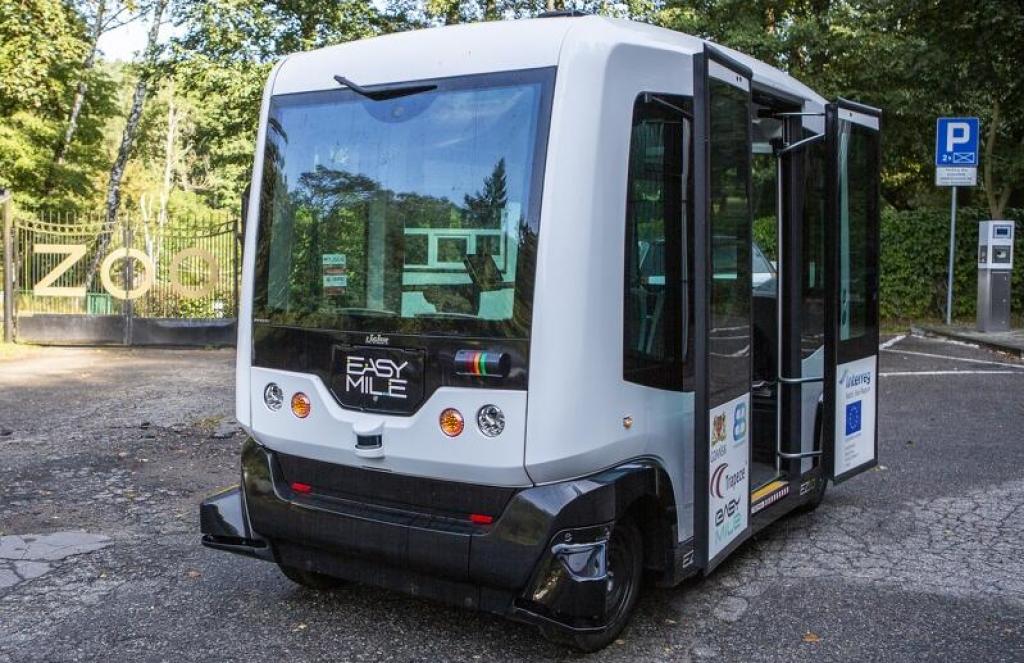Thessaloniki gets ready for its metro launch in November
The underground rapid transit lines have been under construction for almost two decades due to various project delays
 TheMayor.EU logo
TheMayor.EU logo 
This autonomous shuttle participated in the Gdańsk Zoo pilot in 2019, Source: Jerzy Pinkas / gdansk.pl
An autonomous shuttle pilot is to operate at the Łostowicki Cemetery soon
After testing an autonomous bus two years ago, Gdansk is ready to build upon with a second pilot. Thanks to fresh EU funding, the Polish city will this time use the Łostowicki Cemetery to trial a driverless “last mile” solution. The city has just announced that it is currently looking for a contractor to set up the system, which is part of a wider cooperation project for sustainable mobility.
Gdansk announced on its website a tender, scheduled for 23 June, the goal of which is to award the organization of an automated electric vehicle trial running on the site of the Łostowice Cemetery. An autonomous shuttle, that can accommodate at least 8 people, should operate on a pre-programmed route with a length of about 800 metres.
Volunteer passengers could use the transport solution for free for a period between 24 and 36 operational days. The conditions of the tender require that the autonomous shuttle be available for at least 6 days a week (including on the weekends) and at least for five hours a day.
For the first week of the trial, there should be an operator onboard, to react in the case of an emergency, while for the remaining period he would have to supervise the vehicle remotely. Moreover, the vehicle should be equipped with safety sensors, an obstacle detection system (360 degrees) and an auxiliary system based, for example, on video cameras. In addition, the vehicle should be accessible for disabled people.
The trial is expected to run anytime between June and end of September, depending on the capacity of the contractor.
In the Łostowicki Cemetery, people over 65 years of age are allowed to move around with motorised vehicles. Every day, 50 to 70 drivers use this opportunity to drive in the largest, 50-hectare, Gdańsk necropolis. The automated shuttle pilot aims to reduce motorized traffic in the cemetery while supporting people with mobility restrictions.
In 2019 Gdansk already tested an autonomous bus transporting volunteers to the Gdańsk Zoo. The vehicle then travelled 632 km, in total, in autonomous mode and carried 3,325 passengers, but there was an operator on board at all times. The city then conducted a public poll to determine locations for future autonomous mobility trials.
The trial is part of a project called Sohjoa Last Mile (last mile is a term referring to the final stretch of a route, between the main communication system and the destination). It is an international collaboration involving partners from Finland, Norway, Estonia and Latvia, which has received European funding under Interreg Baltic Sea programme to the tune of 85% of the total budget.
As part of project activities, the city will also commission a legal study to determine what legislative changes are needed to make it possible to carry passengers on a regular basis on the public transport network. Workshops for local governments, transport operators and research institutions are also previewed.

The underground rapid transit lines have been under construction for almost two decades due to various project delays

Now you can get your wine in Talence by paying directly in Bitcoin

That’s because the state has to spend money on updating the railway infrastructure rather than subsidizing the cost of the popular pass

Rethinking renewable energy sources for the urban landscape

The examples, compiled by Beyond Fossil Fuels, can inform and inspire communities and entrepreneurs that still feel trepidation at the prospect of energy transition

Now you can get your wine in Talence by paying directly in Bitcoin

The 10th European Conference on Sustainable Cities and Towns (ESCT) sets the stage for stronger cooperation between the EU, national and local level to fast track Europe's transition to climate neutrality.

At least, that’s the promise made by the mayor of Paris, Anne Hidalgo

The underground rapid transit lines have been under construction for almost two decades due to various project delays

At least, that’s the promise made by the mayor of Paris, Anne Hidalgo

Hostal de Pinós is located in the geographical centre of the autonomous region

Despite its church-y name, the district has long been known as the hangout spot for the artsy crowds

Urban dwellers across the EU are having a say in making their surroundings friendlier to people and the environment.

Forests in the EU can help green the European construction industry and bolster a continent-wide push for architectural improvements.

Apply by 10 November and do your part for the transformation of European public spaces

An interview with the Mayor of a Polish city that seeks to reinvent itself

An interview with the newly elected ICLEI President and Mayor of Malmö

A conversation with the Mayor of Lisbon about the spirit and dimensions of innovation present in the Portuguese capital














